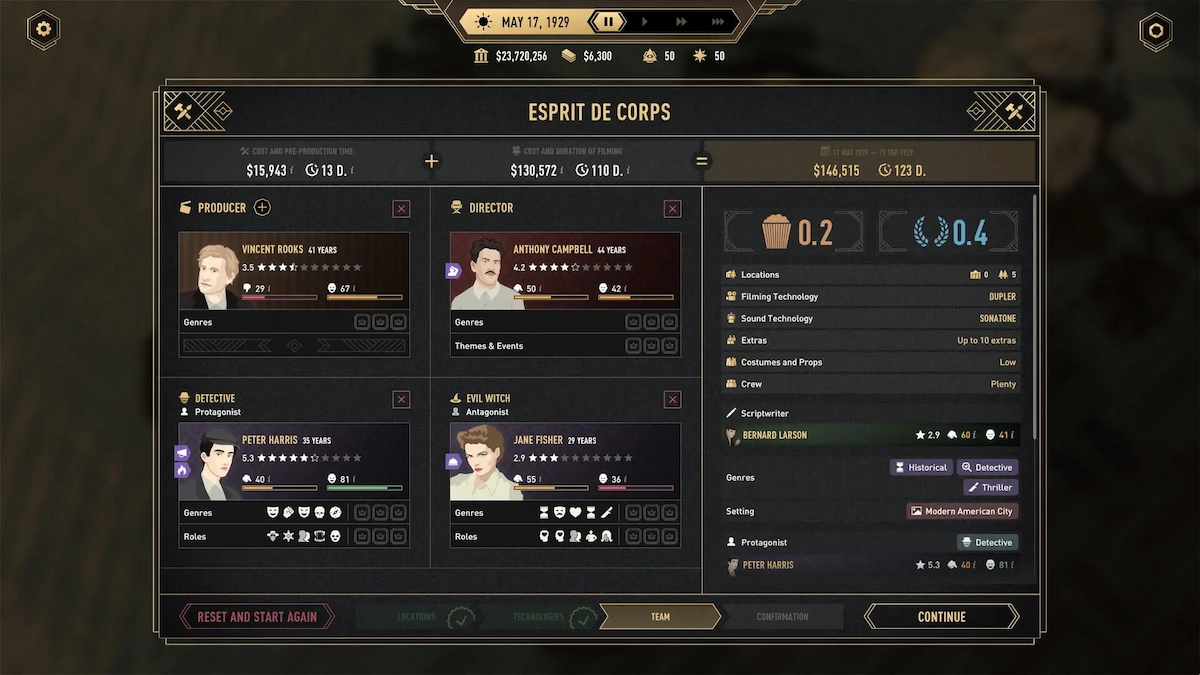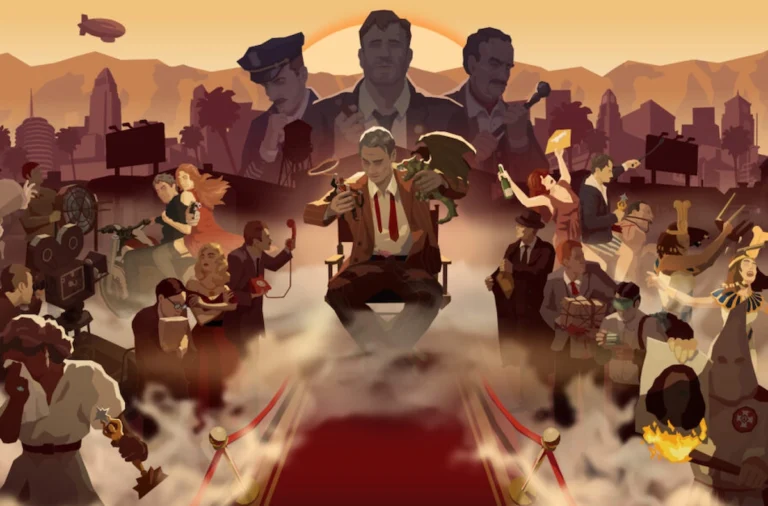It’s surprising that no game has ever truly simulated the film industry. Sure, some games have explored parts of filmmaking or focused on certain roles like directing or screenwriting—but we’ve never had a full-blown business simulation that puts you in charge of a movie studio.
That’s exactly what Hollywood Animal aims to do. The goal is simple but ambitious: build a cinematic empire and dominate the movie industry through clever management, shady deals, and sometimes even ruthless decisions.
First Impressions: Shiny on the Surface, Rotten at the Core
At first glance, Hollywood Animal seems charming, polished, and even relaxing. But it doesn’t take long before you realize that, just like the real-world Hollywood, this world is full of darkness, corruption, and betrayal.
There’s probably no other game that captures the capitalist grip on art and creativity as well as this one. You don’t just see the consequences of the system—you become an active participant in it, making cutthroat decisions that hurt or help others for your own benefit.
A Game That Dares to Criticize While You Play
The game hasn’t received stellar reviews, and many players have voiced complaints about its technical aspects. Still, it’s impossible to ignore how effectively it exposes the ugly truth behind the movie business.
So if you’re looking for a bold, management-driven game that criticizes the entertainment industry from the inside out, Hollywood Animal deserves your attention.
Introducing Hollywood Animal: A Different Kind of Movie Game

There are plenty of games set in Hollywood, but none quite like this. What sets Hollywood Animal apart is that you don’t really make movies in the traditional sense. You don’t write the script or direct the scenes. Instead, your job is to choose a film’s concept, and everything else is handled procedurally.
Your main responsibility is to manage everything before and after production—from hiring writers, directors, and technical staff, to coordinating post-production and marketing. There are hundreds of roles to fill and oversee.
Each hire comes with unique skills and personalities. They work at different speeds, have different levels of talent, and may clash with one another. That’s why team chemistry is so important. You’re working against both tight deadlines and limited budgets, and it’s up to you to finish production as quickly and smoothly as possible.
From the Editing Room to the Big Screen
Once filming is complete, the movie enters post-production. Editors, producers, and directors work together to shape the final product, all based on your goals and budget. At the same time, your marketing department is busy promoting the film before its release.
Finally, the finished movie is handed over to your distribution team, which launches it across theaters nationwide. The journey from concept to cinema is long, and every step in between needs your attention.
Gameplay Overview: From Zero to Mogul
Just like other management games, Hollywood Animal starts you off small. You begin as an investor who’s just bought a bankrupt studio. You give it a new name, fix it up, and slowly bring it back to life.
Early on, you can’t afford to hire top talent. Your actors are inexperienced, your directors unreliable, and your writers may be completely unqualified. But because they’re cheap, you can use—or even exploit—them to your advantage.
Eventually, you’ll face a big choice: Do you remain a small studio that churns out lots of low-quality films, or do you become a prestige brand that only releases one masterpiece every few years? The profits may be similar, but the path you choose will define your legacy.
Character Personalities Matter—A Lot
Anyone who follows Hollywood news knows that actors and directors are often loved or hated not just for their work, but for who they are off camera. That same logic applies in Hollywood Animal.
Every person you hire has unique personality traits, preferences, and working styles. These traits influence not only the quality of your movie, but also how well your team members collaborate. Choosing the right mix of personalities can make or break your film.
Hiring the wrong director, no matter how talented, could cause chaos if they clash with your lead actor.
How One Bad Decision Can Ruin Everything
One of the game’s best features is how your decisions ripple across the system. In one playthrough, I faced a serious budget crisis during script development. To keep production alive, I accepted a large sum from a local tycoon—in exchange for casting his son as the lead actor.
That money saved the project, but came with a catch. The original actor had to be recast in a supporting role—as a knight in heavy armor. But it turned out he couldn’t move properly in armor or act naturally in that costume.
Filming was delayed for weeks. The budget evaporated. A decision I thought would save the movie nearly bankrupted my studio. That’s the beauty of Hollywood Animal—it forces you to weigh every move, knowing that the smallest misstep can lead to disaster.
Total Control, Tough Decisions, and Moral Grey Zones
What really makes this game shine is the level of control and influence you have over every part of the process. You’re not just the head of one department—you oversee everything. From script ideas to cinema releases, every success or failure is tied directly to your actions.
But beware: Hollywood is brutal. You’ll often face difficult choices. Should you bend the law? Threaten an employee? Delay a film just to hurt a rival?
Maybe your ideal lead actor doesn’t want to work for you. You can offer more money—or threaten their family. Maybe a competitor plans to release a similar movie. You can delay your own release to avoid losing profit.
You get the idea: moral choices in this game are rarely clean or easy.
Final Verdict: A Unique and Ruthless Simulation
Hollywood Animal may not be technically perfect, but it’s one of the most original, daring, and thought-provoking management sims on the market. It’s not just a game—it’s a dark mirror held up to the movie industry.
If you’re ready for a management experience that’s less about happy endings and more about power, ethics, and corruption, then this is one game you shouldn’t miss.
